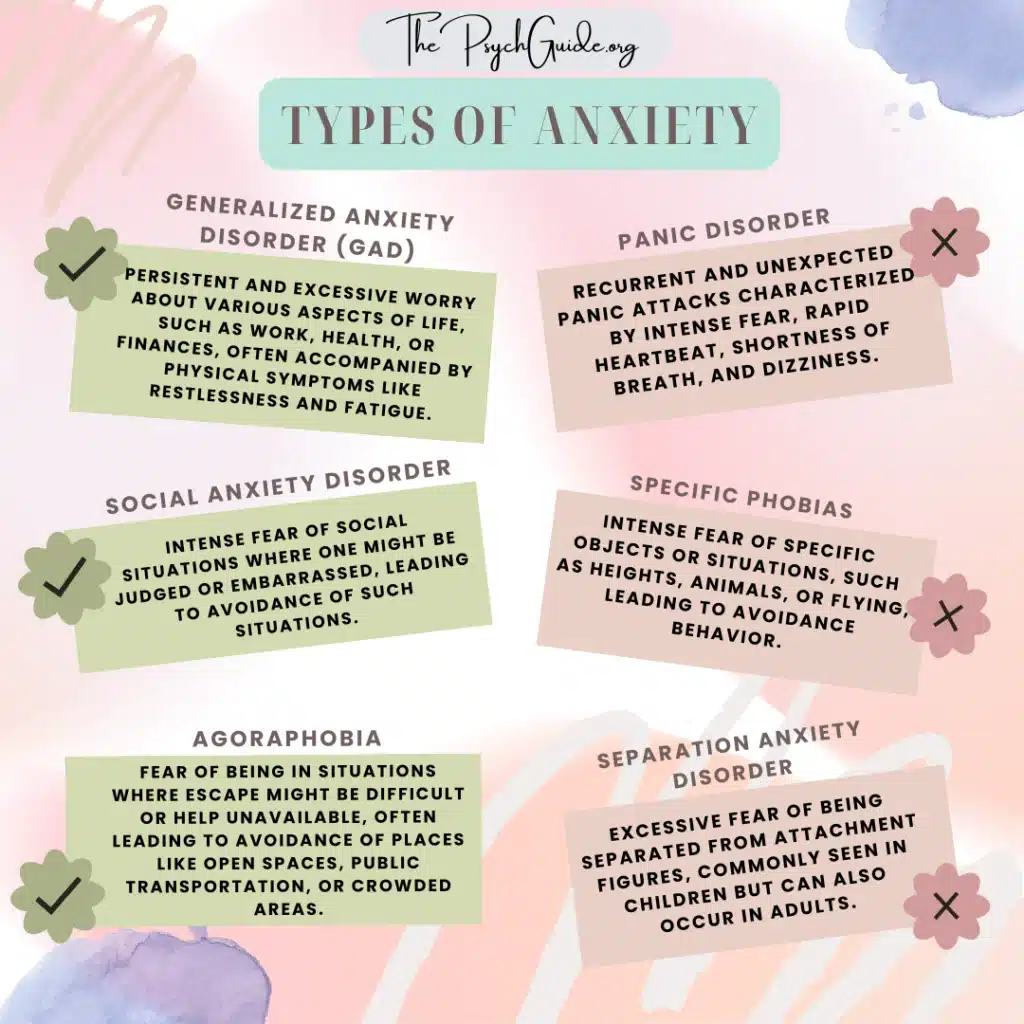If you are here, then you must be someone who is interested in taking collagen but is wondering, Can collagen cause anxiety? Currently, there’s no clear evidence that collagen directly causes anxiety. However, some people might experience anxiety as a side effect.
Collagen supplements stand out as an emerging hero when searching for radiant skin, robust joints, and general vitality. Marketed as a fountain of youth, these supplements come in pills or powder form, catering to health-conscious individuals of all ages by offering a range of appealing health benefits.
However, their rising popularity has also brought up some concerns. One of the most common questions is: Can collagen supplements cause anxiety?
To fully understand the link between collagen and anxiety, let’s dive deeper into this topic and find the answer to, “Can collagen cause anxiety?” By the end of this blog, you’ll have a better understanding of the potential connection and how it might affect you.
If you’re interested in learning more about managing anxiety and improving your overall well-being, check out our recommended self-help books at the bottom of this post.
Table of Contents
ToggleWhat is Collagen?
Collagen is the most abundant protein in the body, making up roughly 30% of the total protein. Collagen acts like a glue that holds everything together. It’s found in your skin, bones, muscles, tendons, ligaments, cartilage, and even your blood vessels and organs. Collagen gives your skin its plumpness and elasticity and helps your bones withstand pressure.
Collagen is mainly made up of amino acids; the three amino acids are hydroxyproline, glycine, and proline. However, it lacks tryptophan, which is an essential amino acid, thus making it an incomplete protein.
Your body naturally produces collagen, but production slows down as you age.
Certain nutrients, like vitamin C, proline, and glycine, are needed for collagen production.
What role does collagen play?
The primary role of collagen is to support and strengthen your overall body. But here are some prominent roles collagen play:
- Collagen replaces dead skin cells.
- Collagen provides a protective layer on organs.
- Collagen provides structure, strength, and elasticity to your skin.
- Collagen also helps in the blood clotting process when there is an injury.
- Collagen, an essential component of cartilage, promotes joint health. It increases flexibility and provides joint pain relief.
- Precautionary Note: Although most collagen supplements are well tolerated and have few known adverse effects, some of them contain common food allergens like eggs, fish, and shellfish. Collagen supplements containing these ingredients should be avoided by those who are allergic to these foods.
- Some people feel heartburn and nausea while taking collagen supplements, but according to research by the NIH, these symptoms are not recognized as side effects of collagen supplements.
So before moving on to our main topic, Can Collagen Cause Anxiety? Let’s also learn briefly about anxiety.
What is Anxiety?
Anxiety is a normal emotion that everyone can feel in their life, but anxiety that lasts for a long period could lead you towards anxiety disorder. But in simple words, anxiety is defined as “the psychological state characterized by worry, nervousness, or fear that is severe enough to interfere with your day-to-day activities.”
According to the WHO, “301 million people worldwide suffered from anxiety disorders in 2019, making them the most common mental illness.”
However, every anxious person feels different types of anxiety and has different anxiety symptoms. Symptoms may affect day-to-day tasks like relationships, work performance, and schooling.
Common Types Of Anxiety:
Anxiety can take many different forms. It displays symptoms that are both mental and physical. Now let’s explore them:

Can Collagen Cause Anxiety?
As we age, our bodies produce less collagen, leading to joint discomfort, thinning skin, and wrinkles. Many turn to collagen supplements to combat these effects and improve appearance. While these supplements offer benefits, some wonder, “Can Collagen Cause Anxiety?”
As collagen has a positive effect on the physical body, its impact on mental health is sometimes overlooked. So, understanding the relationship between collagen and anxiety is important and requires a lot of in-depth research. However, there is no clear evidence or research available that directly proves that collagen can sometimes be a cause of anxiety. Still, potential risks exist while taking collagen supplements.
Let’s take a look:
1. The Role of Tryptophan
A special amino acid called tryptophan serves as the building block for serotonin, a neurotransmitter responsible for regulating our mood. Low levels of tryptophan can lead to decreased serotonin, resulting in mood swings, anxiety, and depression. According to the research, tryptophan metabolism and serotonin levels have a strong link with mental health disorders such as anxiety and depression.
2. Histamine Content
Histamine is a chemical naturally present in the body that plays a role in immune response and other functions. Some collagen supplements may contain trace amounts of histamine, or they might trigger the body to release its own histamine. For those who are sensitive to histamine, this could contribute to anxiety.
3. Gut-Brain Axis
Research shows a strong link between gut health and mental health, known as the gut-brain axis. Collagen supplements are often used to improve gut health, but they can alter the gut microbiome. These changes in gut bacteria might influence anxiety levels, affecting mental well-being.
4. Imbalance of amino acids
Collagen is rich in proline, hydroxyproline, and glycine. While glycine is known for its calming effects, an imbalance or excessive intake of these amino acids can disrupt neurotransmitter activity and mood. This disruption may lead to anxiety symptoms. It’s important to monitor amino acid intake and maintain balance to avoid such issues.
5. Quality and Additives
Low-quality collagen supplements may contain fillers and preservatives. These additives can cause adverse reactions, including anxiety. Choosing high-quality, pure collagen supplements is essential.
6. Placebo Effect
The belief that collagen might cause anxiety can actually trigger anxiety in some individuals. This psychological response can lead to real anxiety symptoms. Awareness and education about supplements can help mitigate this effect.
There isn’t much proof in the scientific literature right now that collagen supplements cause anxiety levels to rise. More research is needed to definitively link collagen to anxiety. However, the above mentioned factors show an indirect connection, indicating why some people may experience anxiety after taking collagen.
If you are a person who is already suffering from anxiety and also interested in taking collagen supplements so, first Start with a small dosage of collagen and increase it gradually; observe your mood and anxiety levels closely. If you experience increased anxiety, stop using the product and consult with a doctor.
Other Causes Of Anxiety
In addition to collagen, there are many other possible causes of anxiety. These causes can be physical, emotional, or environmental Among them the common causes of anxiety are:
- Stress.
- Traumas.
- Thyroid problems.
- Heart problem.
- Chronic illness.
- Financial concerns.
- Feeling alone.
- Lack of physical exercise.
- Poor eating routine.
- Sleep disorders.
Knowing the underlying causes of anxiety may help create effective treatment plans.
How to cope with collagen-induced anxiety?
After knowing the collagen anxiety relationship, let’s move forward toward the coping tips you should know to manage your anxiety. Managing anxiety while taking collagen supplements requires using a variety of coping mechanisms to make sure the supplements aren’t making the situation worse. Here are some valuable tips that you should keep in mind.
- Consult with a professional healthcare provider:
For a deeper understanding, speak with a healthcare provider if you suspect that using collagen is the source of your anxiety.
- Add more tryptophan to your diet:
If collagen triggers your anxiety, it might be due to lower tryptophan levels. Tryptophan is an amino acid needed for serotonin production, which helps regulate mood. Consider a balanced diet rich in tryptophan in addition to collagen to support mood.

- Choose High-Quality Supplements:
Opt for reputable brands that offer pure collagen without unnecessary additives or allergens. Quality supplements reduce the risk of adverse reactions that could exacerbate anxiety.
- Look at Substitutes for Collagen:
If collagen supplements don’t suit you then try alternatives to it that do not lower your tryptophan levels. The substitute sources for collagen include :
| Natural Food Sources | Plant-based sources(Nutrition) | Supplements |
| Chicken: Collagen is found in the connective tissues and skin of chickens. | Beans: Rich in the amino acids and protein needed for collagen production. | Silica: This supplement is found in certain types of foods that help your body to produce natural collagen |
| Fish: Fish skin and bones are beneficial as they contain a good amount of collagen. | Nuts and Seeds: High in vitamin E, which supports the defense of collagen fibers. | Biotic: Biotics include vitamin A B that supports healthy hair, skin, and nails. |
| Bone Broth: Bone broth is an excellent natural source of collagen because it’s high in collagen, amino acids, and minerals. | Berries: All types of berries are rich in antioxidants, which shield collagen. | Vitamin C: Essential for the synthesis of collagen, it can be taken as a supplement to promote the body’s natural production of collagen. |
Stress-Reduction Strategies:
- Take part in enjoyable activities to de-stress and divert your attention. Diverting your attention and doing something that you like helps reduce anxiety levels.
- Engage in practices for relaxation like progressive muscle relaxation, yoga, exercise, and tai chi.
- In order to cope with anxiety, make sure your diet is well-balanced and full of nutrients, including zinc, magnesium, and B vitamins, which are known to support mental health.
- Your sleep hygiene plays a very vital role in decreasing your anxiety level. If you have sleep issues, this will raise your anxiety level. So, maintained a balanced sleeping schedule.
Remember that numerous factors contribute to anxiety, so speaking with your doctor should come first before taking any independent action.
Top-rated Books You Must Read
- Collagen is Life: A pillar of youthful skin that will also boost your heart, bones, and joint health.
- Overcoming Health Anxiety: This is a self-help guide that contains cognitive and behavioral techniques. It is the best book for those who want to cope with their OCD and healthy anxiety.
- The Anxiety and Phobia Workbook: A comprehensive book that provides exercises and strategies for coping with anxiety. The book gives you a step-by-step plan to help you understand your anxiety and create practical coping mechanisms.
Organizations that provide therapy
These are a few online resources that offer support and therapy to help you get over your anxiety .
- Talkspace: It is an organization that offers therapies from certified therapists through audio, videos, and messaging. They offer specific courses to help with anxiety management.
- Help Guide: It offers beneficial tools and information to promote psychological wellness and health.
- NAMI: It is an organization for people with mental disorders. To help all people and families affected by mental illness lead better lives, NAMI offers advocacy, information, support, and public awareness.
Conclusions
To wrap it up, Can collagen cause anxiety? There’s no easy yes or no response to this question. However, there isn’t any conclusive data or study that identifies a connection that shows collagen is causing anxiety.
One of the main ingredients in collagen, glycine, has calming qualities that may even help some people feel less anxious. However, a unique amino acid known as tryptophan can be a possible cause of anxiety.
It’s essential to keep in mind that every person is unique and will respond to supplements in different ways. It’s always best to consult your doctor before taking any collagen supplements.
I am sure now, after reading this detailed blog, you are all clear about the connection between Anxiety and Collagen.
- You may also like Can Anxiety Cause Tics and Can Collagen Cause Depression
Frequently Asked Questions
1. Can collagen supplements cause anxiety?
Although there isn’t any solid scientific proof that collagen supplements cause anxiety, people’s responses can differ. Digestion problems or other collagen supplement-related factors may cause anxiety in certain people.
2. Can improving gut health reduce anxiety related to collagen supplements?
If digestive problems are causing your anxiety, then improving your gut health may help lessen your symptoms of anxiety. To support gut health, take collagen supplements along with digestive enzymes or probiotics and eat a balanced diet.
3. Who should not take collagen?
Although the NIH shows no specific side effect of collagen, people who are allergic to seafood or suffer from liver or kidney disease should avoid taking collagen.
4. What effects does collagen have on psychology?
According to research, collagen may have advantages for people’s skin and joints in addition to possibly enhancing their mental health. Although there isn’t any proof that collagen improves mood, it might have an indirect impact on mental health through processes like reducing inflammation or enhancing gut health.
5. What is the side effect of collagen in the body?
Collagen supplements may cause allergic reactions, increased calcium levels (particularly from marine collagen), gastrointestinal problems (such as bloating, diarrhea, or constipation), and, in rare instances, mood or anxiety disorders. So, always seek medical advice if you have any negative side effects.
6. When to stop taking collagen?
- You should stop taking collagen if you notice and experience any adverse effects, such as increased anxiety, allergic reactions, or stomach problems.
- Discuss with your doctor about stopping the use of collagen supplements if you have been diagnosed with a health condition such as certain liver or kidney problem.

